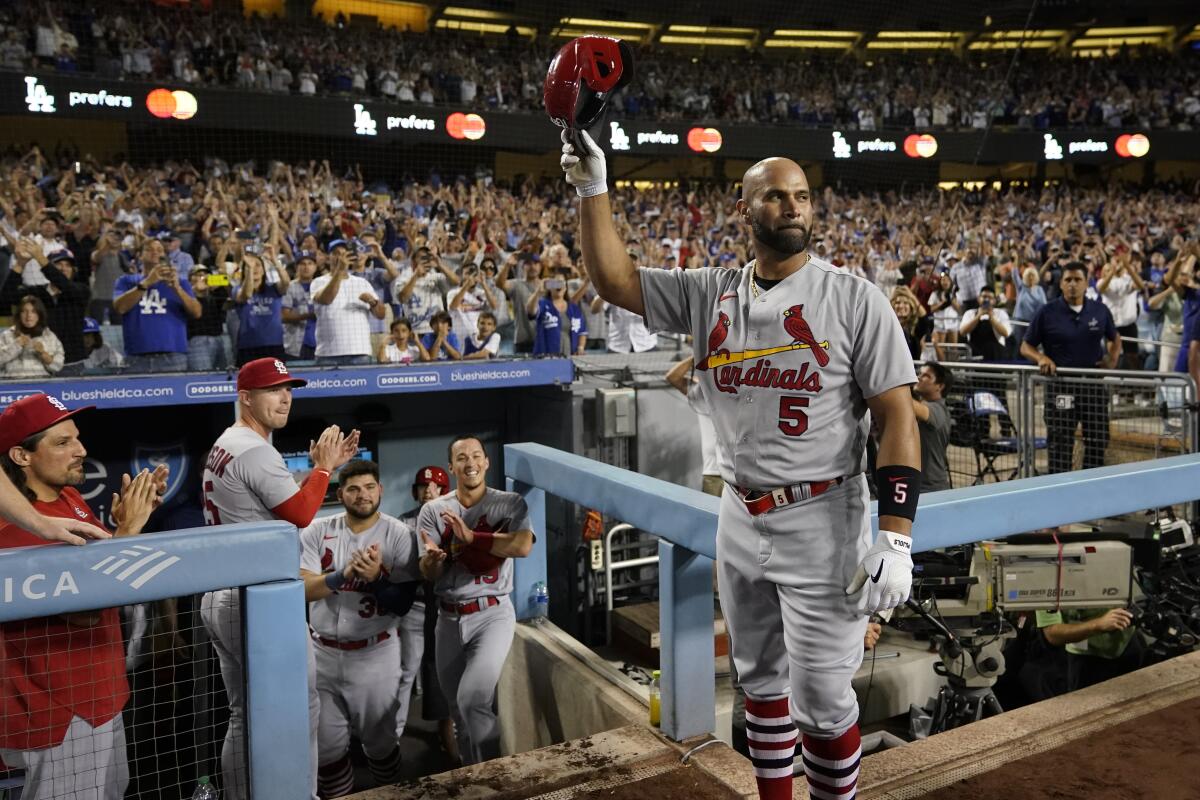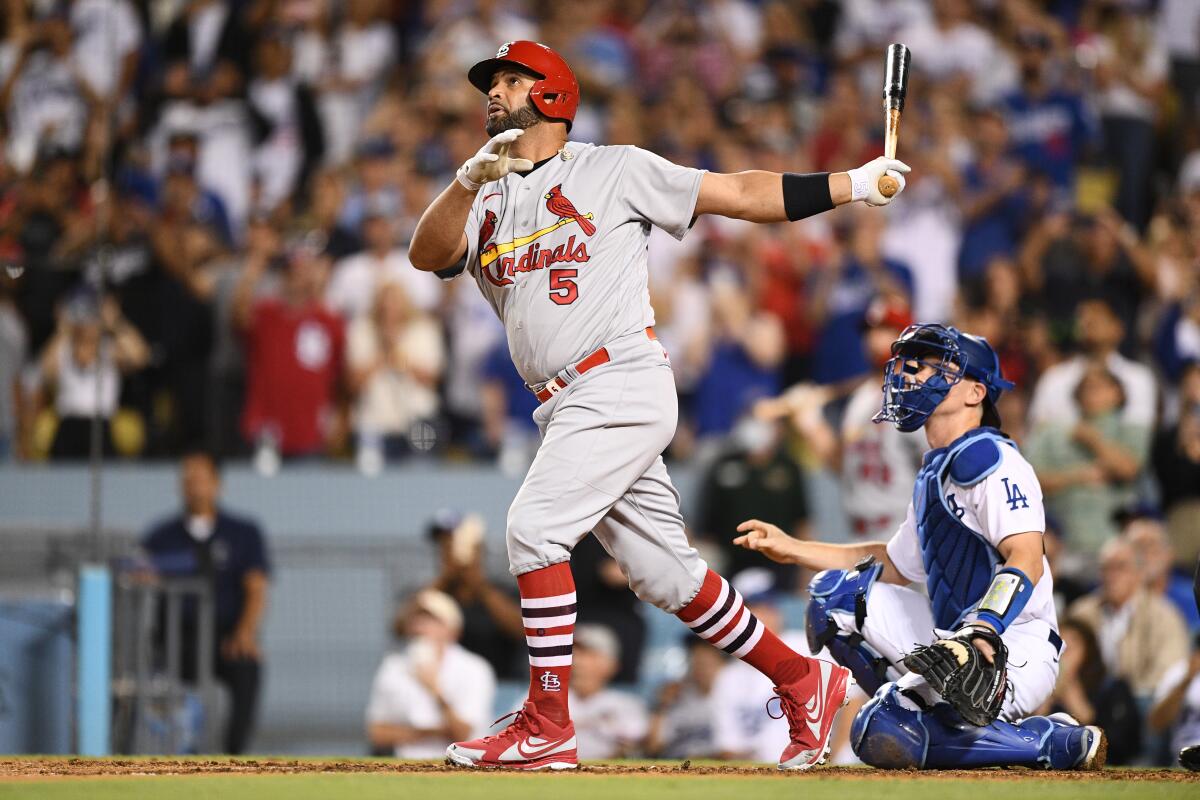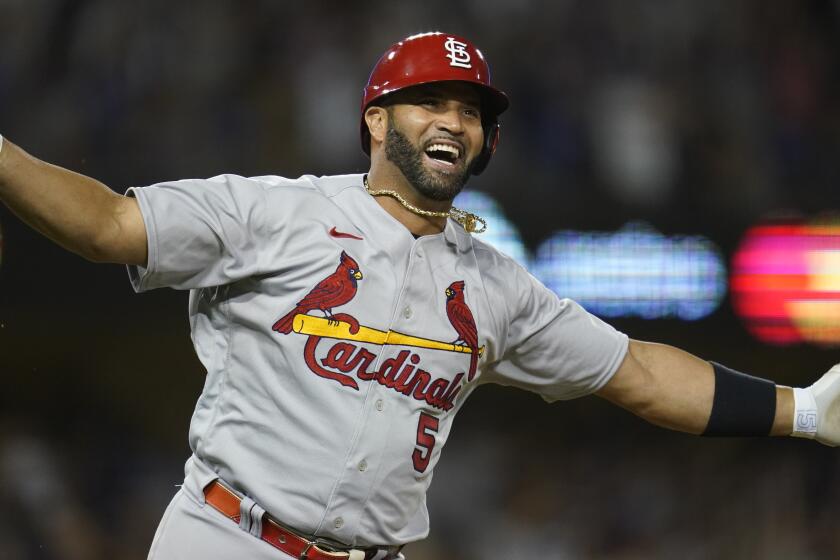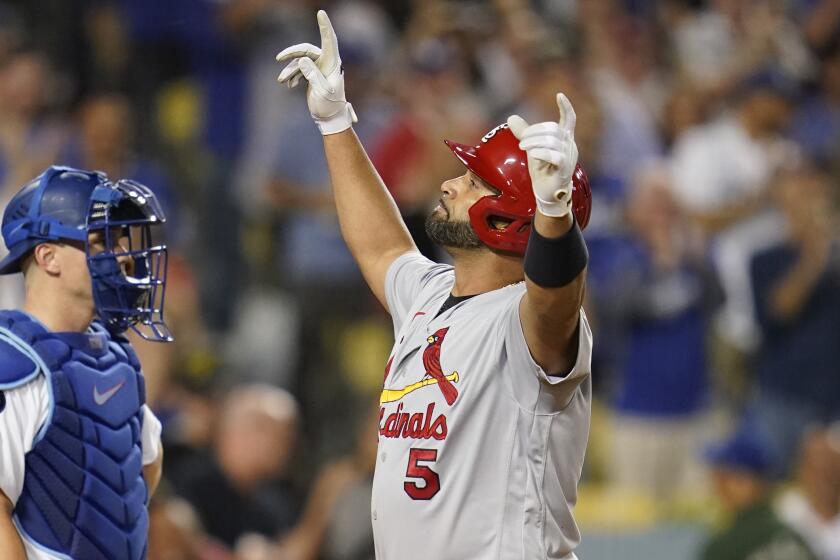Albert Pujols’ 700th home run carried a special significance for Latinos

The visiting dugout had emptied, members of the St. Louis Cardinals waiting in front while Albert Pujols rounded the bases in a regular-season game for the 700th time in his major-league career. The Dodger Stadium crowd had flipped, cheering for Pujols despite him wearing the road grays. Even a few Dodgers players clapped.
It was a moment to cherish, and the first person Pujols wanted to share it with was a man sitting in the front row behind home plate. That’s where Adrián Beltré was sitting.
Like Pujols, Beltré is a former Dodger and a future Hall of Famer. Above all, like Pujols, Beltré is from the Dominican Republic. So Pujols beelined over to the retired third baseman after crossing home plate for two high fives.
St. Louis Cardinals slugger Albert Pujols hit his 700th home run, joining Barry Bonds, Hank Aaron and Babe Ruth as the only players to reach the milestone.
“He was there in batting practice today, we had a little talk,” Pujols, 42, said. “And I told him, ‘Man, I want to do this for our country, too, because they wanted this so bad.’”
Pujols joined rarified company with his blast off Phil Bickford. Only Barry Bonds, Hank Aaron and Babe Ruth had reached 700 home runs. It was a feat celebrated across the majors Friday night. But there was another layer to the achievement for Latinos, especially Dominicans, in the sport.
Unlike the first three members of the 700 club, Pujols was born outside the United States, in the Dominican Republic. He was raised in Santo Domingo before moving to the United States as a teenager. His ascendance from 13th-round draft pick to one of the most accomplished players in Major League Baseball demonstrates the impact the Dominican Republic — and Latin America as a whole — has made on the league.
Pujols’ standing amongst his peers is represented around his neck, where he’s worn a chain with a “600” medallion gifted by retired Dominican player Edwin Encarnación after reaching 600 home runs.
Fittingly, No. 700 came on the 66th anniversary of Ozzie Virgil Sr. becoming the first Dominican-born player to appear in a major-league game.
“We used to think of Babe Ruth like, ‘Oh my God, Babe Ruth. Did he really do that?’ And now Albert is up there. It’s like he’s superhuman. He’s carried the flag not only for Dominican, but Latin American players.”
— Jose Mota, Dodgers radio broadcaster, on Albert Pujols
“Seeing him run the bases in that moment for No. 700 was a special moment,” Dodgers infielder Hanser Alberto, the only Dodger born in the Dominican Republic, said in Spanish. “It’s something that fills us with pride — all of us Dominicans, Latinos, the people who really use this sport to lift ourselves, with a dream, with a goal.”
José Mota, a Dodgers broadcaster, watched Pujols’ home run from the Dodgers’ Spanish-language radio booth behind home plate. He wasn’t calling the game, but he wanted to be in attendance just in case.
Mota, a former Angels broadcaster born in the Dominican Republic, and Pujols became close friends during Pujols’ 10 seasons in Anaheim. So close that AJ Pujols, Albert’s 21-year-old son, was with Mota in the booth when his father smashed Bickford’s hanging breaking ball.
“We used to think of Babe Ruth like, ‘Oh my God, Babe Ruth. Did he really do that?’” Mota said. “And now Albert is up there. It’s like he’s superhuman. He’s carried the flag not only for Dominican, but Latin American players.”

“It was just an amazing moment. He’s someone you can say is an example to follow. We’re proud of his career. He’s done so much for Latinos.”
— Brusdar Graterol, Dodgers reliever, on Albert Pujols hitting 700 home runs
Mota’s father, Manny, came from the Dominican Republic to play 20 seasons in the majors, including parts of 14 with the Dodgers, and remains a presence at Dodger Stadium. Pujols ran to him to speak before Friday’s game. On Saturday, Manny, 84, made sure to head to the Cardinals clubhouse to spend time with Pujols.
“Oh, my dad was beside himself,” José Mota said.
The affinity extends to players from other Latin American countries. The same way Roberto Clemente is revered beyond Puerto Rico and Miguel Cabrera is beloved outside of Venezuela, Pujols has attracted adulation from fellow Latinos.
The respect was evident in the Dodgers’ clubhouse during Pujols’ time with the team last season. Both Julio Urías, of Mexico, and Brusdar Graterol, of Venezuela, said Pujols was an invaluable resource for the team’s Latinos, a respected Spanish-speaking veteran presence they didn’t have before.
“He’s not a star anymore,” Urías said. “He’s a legend, a living legend. And so to have all those numbers, to have all those records, to have all the people talk about him and still have that humility, still be a great teammate, and show us that you always do things to help your family, where you’re from. He taught us a lot.”
Albert Pujols, a beloved mentor as a Dodger last season, joined the elite 700-home run club with his former teammates bearing witness with conflicting emotions.
Graterol smiled remembering his reaction to Pujols’ 700th home run from the Dodgers’ bullpen Friday.
“Do I jump or do I not jump?” Graterol said in Spanish. “What do I do? It was just an amazing moment. He’s someone you can say is an example to follow. We’re proud of his career. He’s done so much for Latinos.”
Alberto said he spoke with Pujols during batting practice before Friday’s game. Pujols told him he felt a weight on shoulders as he chased 700 from not only Cardinals fans but also his home country. After the game, Alberto snuck into Pujols’ press conference to record a video he sent to family and friends in the Dominican Republic.
Everyone back home, Alberto said, was tuned into the game despite its 10 p.m. local start. They were all left celebrating.
“This is an American game and when we come here, we leave behind a lot,” Alberto said. “Family, friends. And when someone has success, we should celebrate them. At the end of the day, it’s good for his country, it’s good for the community. A ballplayer’s success is a community’s success.”
More to Read
Go beyond the scoreboard
Get the latest on L.A.'s teams in the daily Sports Report newsletter.
You may occasionally receive promotional content from the Los Angeles Times.













